Online Course Catalog
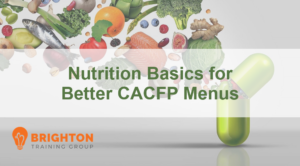
Nutrition Basics for Better CACFP Menu Planning (BTG-502)
Once you have the CACFP meal pattern compliance mastered, the next step in planning CACFP meals is making sure you cover all the basic nutrition needs. In this one hour session, participants will learn the importance of where the CACFP meal pattern comes from and how to incorporate basic nutrition into CACFP menu planning mastery.
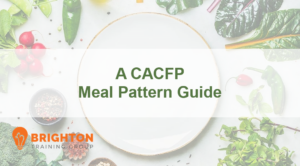
A CACFP Meal Pattern Guide (BTG-505)
One of the hardest parts of planning a CACFP menu is understanding if a food is creditable or not and how much you need to serve. In this brief overview, participants will learn about tools to guide them to determine if a food is creditable to the CACFP meal pattern, and how much they need to serve to be in compliance.
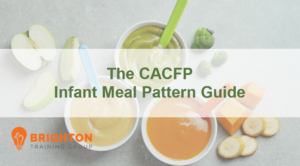
A CACFP Infant Meal Pattern Guide (BTG-506)
One of the hardest parts of planning a CACFP menu is understanding if a food is creditable or not and how much you need to serve. In this brief overview, participants will learn about tools to guide them to determine if an infant food is creditable to the CACFP meal pattern, and how much they need to serve to be in compliance.

All Aboard The Whole Grain Express! (BTG-515)
With a destination of great nutrition and better lifestyles, learning how to incorporate whole grains into your CACFP menu can be a journey. In this one-hour session, participants will punch their ticket and board the whole grain express train, learning about where whole grains come from, how to incorporate them into their menu, and best practices for the preparation methods.

Healthy Food Preparation Techniques And CACFP Menu Planning (BTG-516)
The first challenge is planning a CACFP Menu, but the challenge can continue in figuring out how to prepare food in healthy ways. Learning how to prepare food in a healthy way can maintain optimal nutrition and increase food consumption while building lifelong healthy eating habits for children.

Menu Building Basics: Utilizing CN Labels and USDA Recipes to Build a Cycle Menu (BTG-522)
In this course, participants will learn to recognize the 6 key indicators for a CN Label is, what a product formulation statement is, and how to use them to build a cycle menu. In addition, participants will explore the vast resources of USDA Standardized recipes, and will learn how to scale these recipes and products to fit their production needs. Lastly, participants will understand the basics of record retention and what documentation would be needed to support food production records, if required by their state.

SFSP Meal Planning for Summer Success! (BTG-523)
A winning meal is the key to getting great attendance and keeping kids coming to your site all summer long. While SFSP has its special challenges, in this hour our course, participants will explore exciting menu options for cold meals and hot meals. Participants will learn the SFSP meal pattern and then discover how much creativity and flexibility it has to build the best meal pattern for their needs.

Navigating Special Dietary Needs (BTG-512)
CACFP sponsors may need to modify planned meals in order to accommodate participants with disabilities, medical needs or special dietary needs. The course summarizes the responsibilities sponsors have when accommodating participants’ meal requests. The course also discusses medical statements, meal pattern requirements, and accommodating non-disabling special dietary needs.
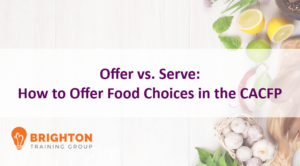
Offer vs Serve: How to Offer Food Choices in the CACFP (BTG-513)
OVS or Offer vs Serve can be a challenge to introduce into your CACFP program and even harder to maintain CACFP compliance throughout menu planning and service. In this hour-long session, participants will learn the rules to OVS success, how to plan menus and prepare meals to maintain compliance, and tips for best practice when incorporating it into their centers.
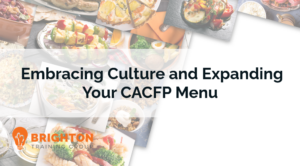
Embracing Culture and Expanding Your CACFP Menu (BTG-509)
Is your menu feeling a little lackluster? Do you want to infuse new and exciting items into your menu while teaching children about world citizenship and other cultures? In this one hour session, participants will learn how to expand their menus through exploring new cultures and ethnic foods, resources for standardized recipes, and maintain CACFP meal pattern compliance.

Family Style Meal Service – Building Better, Healthier, Menus and Eating Habits (BTG-514)
Family style meal service has the opportunity to teach children so much more than just how to eat. Learn the benefits of family style meal service, best practices to incorporate it into your meal service option, and what you must do to maintain CACFP Compliance. In addition, participants will learn best practices for conversations starters around the meal table, how to encourage staff to role model positive eating behaviors, and what equipment is need for family style meal service success.

Seasonality and the CACFP Menu (BTG-511)
How can you make an impact to your budget and your menu in one change? Plan your menus according to the seasons. In this one hour session, participants will learn about growing seasons for different regions of the US, how to plan menus with built in flexibility for seasonality, and maintain CACFP meal pattern compliance.

How To Order, But Not Too Much: A Hands On Method In Calculating Quantity Needs For CACFP (BTG-507)
Having excess inventory on hand can be costly, but not having enough inventory on hand can result in not serving enough food, and ultimately non-compliance and findings. In this one-hour session, learn how to calculate adequate inventory needs, while also learning how often inventory needs to be completed and best practices for stock rotation.

Power Boost your Breakfast Menu with Meat/Meat Alternates (BTG-518)
What an exciting opportunity to impact children’s nutrition and health by being able to incorporate meat and meat alternates into your breakfast menu. Throughout this interactive one-hour course, participants will explore meat/meat alterations, their health benefits, and learn best practices to incorporate them into their CACFP breakfast menus.

Trailblazing the Fruit and Vegetable Frontier (BTG-521)
With Fruit and Vegetables now separate components, there are endless possibilities in incorporating great nutrition into your CACFP menus. Discover the great nutrition fruits and vegetables provide, which are the best sources of Vitamin C and A, and how often you should plan to serve them in your menus. Learn new and exciting best practices for introducing new fruits and vegetables on your menus across all meal services, as well as innovative preparation techniques.

Exploring and Eliminating Choking Hazards in CACFP Menu Planning (BTG-520)
Did you know that choking is the 4th leading cause of death for children under age 5? Have you ever thought about what might be a choking hazard in your CACFP Menu? In this engaging one hour study, participants will learn common food choking hazards, explore cooking methods to prevent choking hazards, and learn best practice service methods to prevent choking in their child care setting.
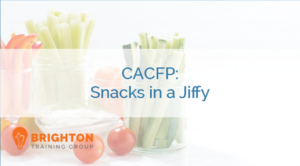
CACFP Snacks in a Jiffy! (BTG-519)
Want to serve CACFP Snacks, but you are limited on preparation space? Want to learn what snacks you can serve in a pinch when you are short on staff? In this one hour session, participants will learn how to provide variety in a CACFP menu, while still striving for optimal nutrition with a snack meal that requires little to no preparation.

Getting Everyone on the Same Plate: Teaching Teachers About the Child and Adult Care Food Program (BTG-503)
This training is all about the Child and Adult Care Food Program or CACFP. The course covers topics such as what the CACFP program is and what it does, who is eligible to sponsor or offer the CACFP and which children are eligible to participate or receive meals through the program. In addition, the course covers CACFP meal patterns, how to accommodate children with disabilities that affect the diet and recordkeeping requirements that are important for everyone involved with the CACFP to be aware of – even teachers!

Enhancing Meal Appeal For CACFP – Feeding Their Senses! (BTG-501)
Explore how to enhance your CACFP meals and decrease food waste by planning and preparing meals that appeal to all 5 senses. In this one hour session, participants will learn how to examine menus and prepare meals that not only taste great, but look, smell, feel and even sound great!

CACFP Snacks: The Planned Leftover Way (BTG-517)
Wanting to learn how to optimize your CACFP Snack Menu, inventory, and labor? Through this one hour session, participants will learn how to use pre-planning methods to optimize their labor hours, kitchen space and equipment, and inventory to build a CACFP Snack Menu from semi-scratch cooking methods while being mindful of budget and nutrition.